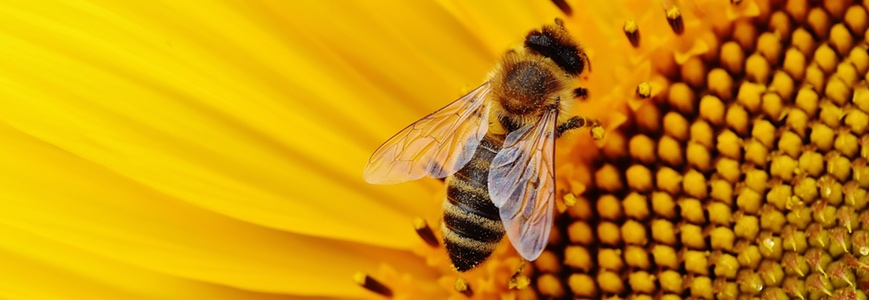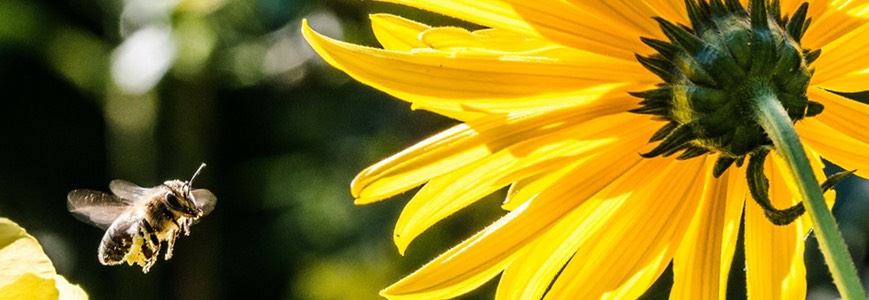THE LANDSCAPING SOLUTIONS BLOG
Welcome to our Blog. Inspiration, updates and industry trends from the team at Landscaping Solutions.
BEES IN CRISIS

Its hard to believe that something so tiny could play such an important environmental role but the fact of the matter is bees are essential to our environment and our economy.
Bees, along with other pollinators such as butterflies, moths, wasps and beetles play a vital role in pollinating the vast majority of our fruit and vegetables. Without them it would cost UK farmers somewhere in the region of £1.8 billion a year to pollinate the crops themselves.
Take bees out of the equation and the environment and our economy is quickly in trouble.
Over the past few years a number of factors such as the use of pesticides, climate change and the loss of natural habitats have contributed to a serious decline in our bee population.
Since 1930 the UK has lost 97% of its flower-rich meadows with hedgerows and chalk grassland also being depleted over the same period. Our wonderful British weather certainly hasn’t helped with a long run of wet summers making the job of finding pollen even harder.
There was at one point 27 different species of bees in the UK, 3 of those species are now extinct and many others including the wild honey bee are dangerously close to extinction.
The numbers do not look good but its not all bad news. A number of organisation such as Friends of the Earth are working to create bee-friendly spaces across the country, as well as lobbying for tougher regulation on the use of pesticides.
Aside from the organisations, replenishing the bees natural habitat is something we can all get involved in. Incorporating more wildflowers in to our gardens immediately provides food and shelter for the bee population and slowly begins to reconnect their natural habitats.
Further information regarding Friends of the Earth and their work is available via their website.
FRONT GARDENS ON THE DECLINE

An interesting article in the Garden Design Journal, discussing the decline of Britain’s front gardens, caught our eye recently.
Written by award winning garden designer Ann-Marie Powell the piece highlights some startling statistics about Britain’s front gardens and the rate at which they are disappearing from our streets.
Surveys commissioned by the Royal Horticultural Society (RHS) highlighted geographical hotspots throughout the country, 47% of front gardens in the North-east of England for example are now over three-quarters paved and when the London Assembly examined aerial photographs of London, they discovered an area equivalent to 22 Hyde Parks had been lost to the paving of front gardens.
That’s an alarming amount of greenery disappearing from our streets and neighbourhoods.
The problem is more complicated though than just the aesthetical look of any given street, its the environmental impact that’s causing the most concern. Plants reduce pollution, regulate temperatures and provide a habitat for wildlife to thrive. The paving and concrete replacing those plants are not only damaging that delicate balance but also increasing the risk of flooding in a number of areas.
However, it appears our gardens aren’t necessarily disappearing as part of some trend but more out of a necessity.
The majority of people probably don't want to have to give up their front gardens but are often forced to opt for functionality. Parking and storing numerous recycling bins can often become a real issue in many streets, especially in built up areas. With more and more of us working longer hours a paved garden is obviously much easier to maintain.
And so, while the precise rate at which our front gardens are disappearing isn’t clear, what is clear is that the sustainability issues we are currently facing with our countries front gardens is very much a reflection of the times we live in.
For now, conserving and improving our front gardens is our only option. By making small changes we can make a difference but until such time as a long term solution is found the future of Britain’s front gardens is unknown.
For further information regarding Ann-Marie Powell’s original article visit www.gardendesignjournal.com
Visit www.rhs.org.uk for information regarding the Royal Horticultural Society and their Surveys.